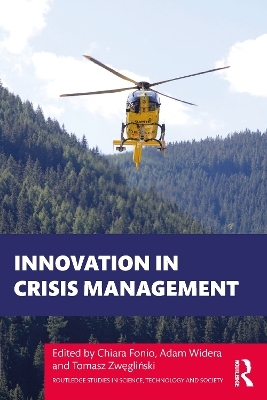
Innovation in Crisis Management
Routledge (Verlag)
978-1-032-18915-4 (ISBN)
This book deals with how to measure innovation in crisis management, drawing on data, case studies, and lessons learnt from different European countries.
The aim of this book is to tackle innovation in crisis management through lessons learnt and experiences gained from the implementation of mixed methods through a practitioner-driven approach in a large-scale demonstration project (DRIVER+). It explores innovation from the perspective of the end-users by focusing on the needs and problems they are trying to address through a tool (be it an app, a drone, or a training program) and takes a deep dive into what is needed to understand if and to what extent the tool they have in mind can really bring innovation.
This book is a toolkit for readers interested in understanding what needs to be in place to measure innovation: it provides the know-how through examples and best practices. The book will be a valuable source of knowledge for scientists, practitioners, researchers, and postgraduate students studying safety, crisis management, and innovation.
Chiara Fonio is Research Associate at the Vrije Universiteit (VU, Amsterdam), Faculty of Social Sciences, Organization Sciences. She has been working in academia and European institutions (Joint Research Centre, European Commission, where the work on the trial guidance methodology was designed and developed). She has extensive experience in European-funded projects and authored a number of publications on crisis management and surveillance (including, among others, Big Data, Surveillance, and Crisis Management, co-edited with Kees Boersma, 2017). Her research interests cover disaster governance, crisis management and surveillance studies. Adam Widera is Managing Director of the Competence Center for Crisis Management at the European Research Center for Information Systems (ERCIS), hosted by the University of Münster, Germany. After graduating in political science, philosophy, and political economy, he pursued his doctorate in information systems. His research areas cover modelling, simulation and performance measurement in humanitarian and disaster relief logistics and design and evaluation of information systems for humanitarians. He has published over 50 research papers in international journals and conferences and has been involved in various international research projects. Tomasz Zwęgliński is Colonel of the Polish State Fire Service working as an academic at the Main School of Fire Service in Warsaw, with above 20 years of experience. He has a PhD in security sciences and a master's in fire engineering, is a qualified expert in the Union Civil Protection Mechanism, and is an expert in crisis and disaster management, CBRN, and occupational safety. He is also a manager of research and international civil protection capacity-building projects (e.g. in Ukraine). His key research interest focuses on the evaluation of disaster management exercises, including new solutions. EU Research Executive Agency expert. His recent publications include Exercising in a Radioactive Environment–a Case Study from CBRNE Exercise in Chernobyl Exclusion Zone (2019), Cascading Effect as a Contemporary Challenge for Crisis Management (2020), and Polish Approach to Sharing Resources Deployable for the EU Civil Protection Mechanism (2021).
Introduction
Part 1: Current and new methodological approaches to assess innovation in CM
1. Measuring Innovation: The Current State of the Art
2. The Trial Guidance Methodology
Part 2: Technical infrastructures to assess potentially innovative solutions
3. Testbed Technical Infrastructure
4. DRIVER+ Online Knowledge Management and Inference Toolset
Part 3: Implementation and evaluation of innovative solutions in crisis management
Sub-Chapter 3.1: Trials Perspective
5. The Trial in The Netherlands
6. The Trial in Austria: Testing New Technologies for Increasing Situational Awareness and the Management of Spontaneous Volunteers
7. New Approach to Selection of Innovative Solutions Tailored to the Practitioners’ Needs
Sub-Chapter 3.2: Simulation as Decision Support
8. Dynamic Flood Modelling in Disaster Response
9. On the Practitioner-Driven Use and Misuse of Simulation as Decision Support: Lessons from a Mass Evacuation Trial
Sub-Chapter 3.3: Situation Awareness Approaches
10. Three Dimensional Model and Orthophotomap’s Quality Evaluation towards Facilitating Aerial Reconnaissance of Flood Response Needs
11. A Multimodal Remote Sensing System for Improved Decision Making in Earthquake Response
Part 4: Towards a paradigm shift in assessing innovative CM solutions
12. TGM Application in a Horizon Project
13. Applying the Trial Guidance Methodology to Evaluate ResponDrone - A Situation Awareness Platform for First Responders
14. STADEM: An Adapted Trial Guidance Methodology (TGM) for Pandemic Management
15. Interoperability and Standardization supporting Preparedness and Response to Disasters
16. Conclusions
| Erscheinungsdatum | 27.01.2023 |
|---|---|
| Reihe/Serie | Routledge Studies in Science, Technology and Society |
| Zusatzinfo | 20 Tables, black and white; 37 Line drawings, black and white; 37 Halftones, black and white; 74 Illustrations, black and white |
| Verlagsort | London |
| Sprache | englisch |
| Maße | 156 x 234 mm |
| Gewicht | 660 g |
| Themenwelt | Mathematik / Informatik ► Informatik ► Theorie / Studium |
| Naturwissenschaften ► Biologie ► Ökologie / Naturschutz | |
| Recht / Steuern ► Privatrecht / Bürgerliches Recht ► IT-Recht | |
| Sozialwissenschaften ► Soziologie | |
| Wirtschaft ► Betriebswirtschaft / Management ► Unternehmensführung / Management | |
| ISBN-10 | 1-032-18915-0 / 1032189150 |
| ISBN-13 | 978-1-032-18915-4 / 9781032189154 |
| Zustand | Neuware |
| Haben Sie eine Frage zum Produkt? |
aus dem Bereich


